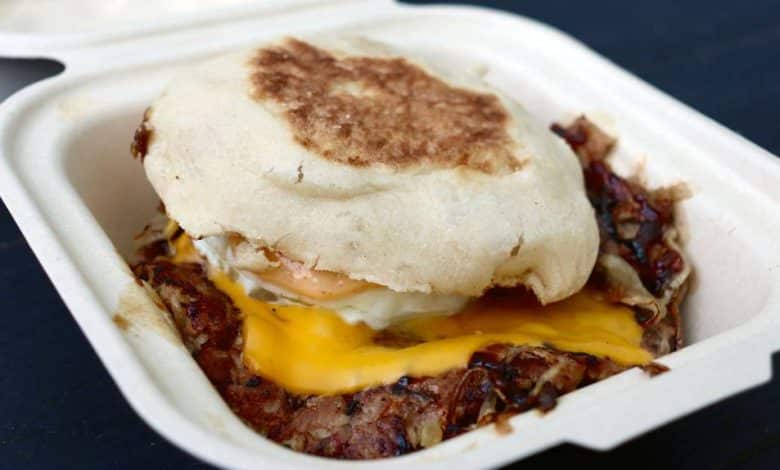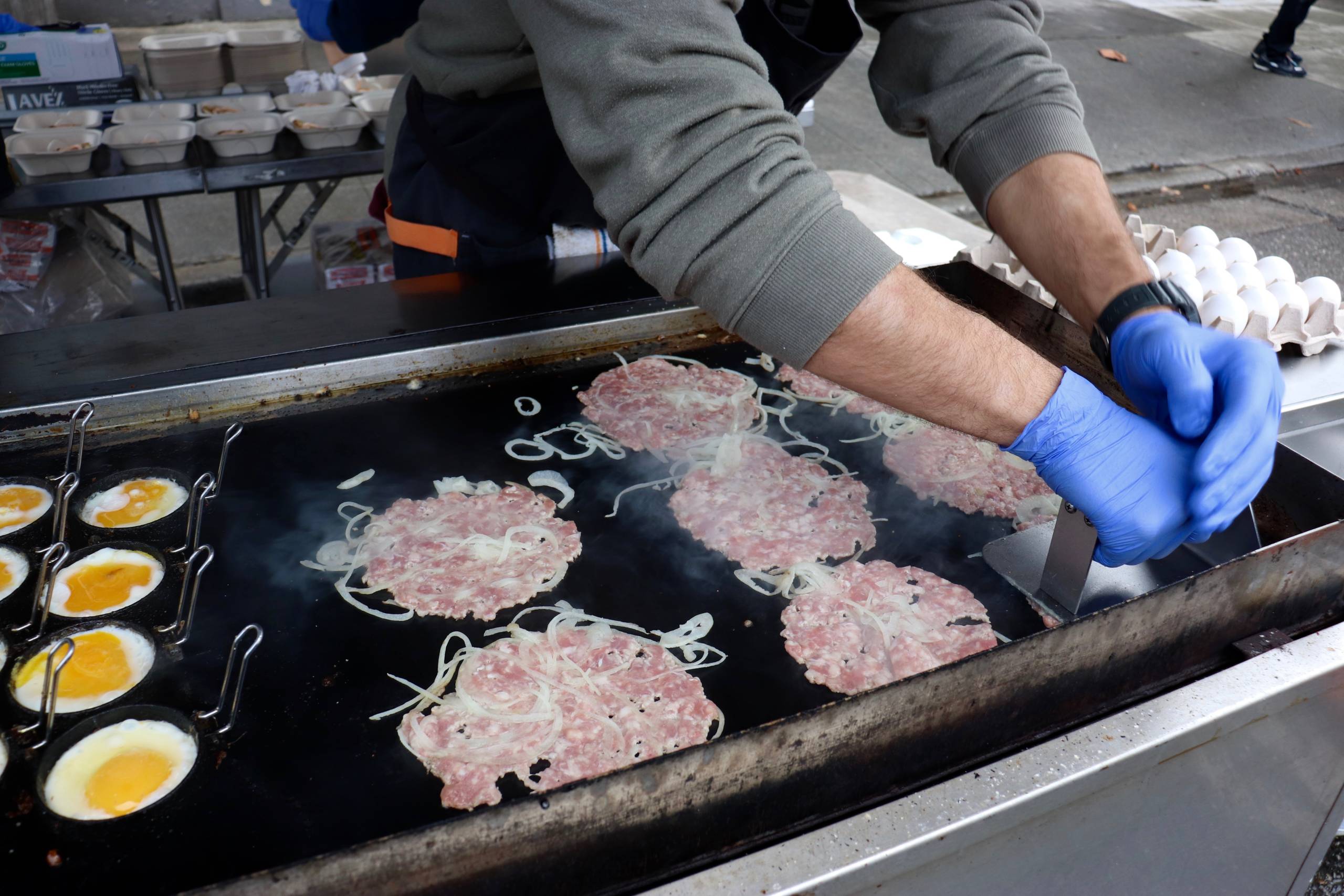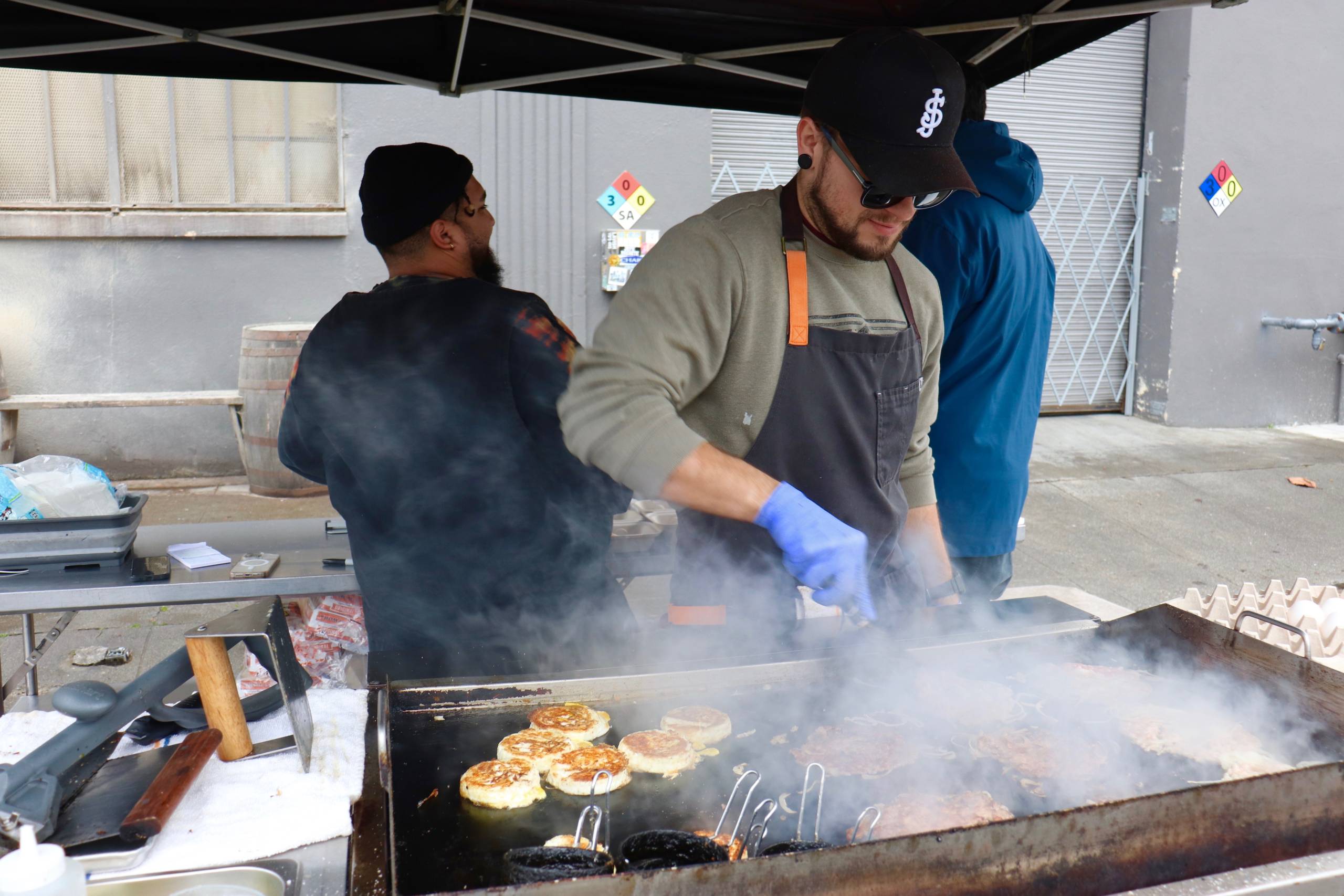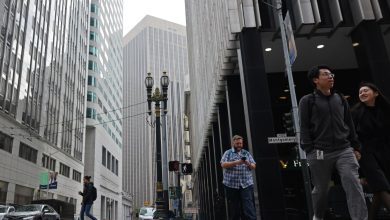San Jose’s Viral Breakfast Pop-Up Is Reborn After County Makes an attempt to Shut It Down

It’s the kind of out-of-body Northern California food experience where — after the smoke-sizzle clears and the flavors have melted into your system — you might hear Mac Dre’s “Not My Job” slapping from a nearby portable speaker. (If Hash N Dash was ever in need of a motto, a remix of what Mac Dre articulated in 2004 would suffice: “I can make you a breakfast sandwich, but anything else, not my job”).

And yet, despite Hash N Dash’s underground success — which peaked in January when a video of its “408 Smash” sando accrued over 1 million views, driving in hundreds of new customers per day — Santa Clara County temporarily banned Salmon and his small crew from operating on February 8.
Salmon says he has been slanging breakfast around San Jose using the same methods since December of 2021. Now, he has to rethink his approach in his hometown, after county officials told him he can no longer run his business in the same way — as a simple pop-up without any infrastructure other than the portable flat-top griddle he sets up at each event.
“It’s been a wild two weeks. The [Santa Clara County] Health Department came for me and said I was illegally vending,” he says. “They said we would need to buy a food trailer or food truck. That’s an expense people can’t pull out of nowhere. We’re just trying to make it in this expensive state and pay our bills. They didn’t provide any tips or resources for anything — just paperwork to fill out. It’s frustrating how they don’t seem to want to help you in the process, and aren’t setting you up for success.”
In his view, the county’s regulations for outdoor food vendors are draconian and inconsistently enforced, singling him out since he “blew up.” Prior to being flagged, Salmon had set up his mobile operation in front of coffee shops around San Jose for over two years without any problem. He says he had agreements with each business he worked alongside, paid for multiple permits and licenses, and fulfilled the county’s health department requirements (such as always being within 30 feet of a bathroom and having access to three compartment sinks).
“I understand the legal process of paying fees; I get it,” says Salmon, who left his full-time job in corporate catering to pursue his passion as an independent food maker. “The problem is that the process is so difficult, and there’s not a lot of room for receiving help to continue thriving and make a living. It’s not conducive to creating a community that says, ‘We care about small business owners.’ It feels the exact opposite. It feels like we’re being driven out.”
Even without this latest obstacle, operating a food business in the Bay Area is far from easy. Between soaring rent, staffing and a variety of unforgiving regional factors, it seems some of the best foodmakers are downsizing rather than expanding while others have decided it’s best to simply pack up. Last year, the San Francisco Chronicle described the Bay Area as being a “terrifying” business environment for local restaurant owners. In that context, starting with a small pop-up seems like it would be the easier, more realistic route.

And yet, at least based on Salmon’s experience, Santa Clara County actually seems to be actively discouraging pop-ups. It doesn’t help that Santa Clara County is among the wealthiest — and therefore most expensive — places to live in the entire country, where owning or renting a brick-and-mortar could account for an exorbitant cost that would paralyze many potential businesses. Factor in the county’s recent rash of violence toward immigrant street vendors, and Santa Clara County may legitimately be one of the harshest places to successfully sustain a food pop-up.
But according to Larry Little, the Santa Clara County Department of Environmental Health Department Communications Officer, “This is more about safety and keeping community members safe.”
“When you get a [temporary] permit, you’re under the umbrella of a larger event that’s happening,” Little says, acknowledging that pop-ups like Hash N Dash, which don’t have a kitchen or a food truck, can’t legally operate in Santa Clara County. “The coffee shop is not a temp event, and they don’t have a permit to sell food there.”
As it stands, then, foodmakers are expected to acquire either “a food truck, trailer, van, the specific mobile food cart [or] the portable units” — in addition to applying for a Mobile Food Facility permit — to operate a pop-up business in the county.
“I don’t want to at all sound like a victim because I’m absolutely not,” Salmon told KQED via text. “But … I do believe it’s a bigger issue. It’s a bureaucratic issue that absolutely needs to be addressed so that steps can be taken to aid small business owners [and give] pop-up vendors the ability to operate as they do in a legal fashion.”
Hash N Dash has paid “around $12k in sales taxes and about $400 in district taxes,” he says. “I’m not trying to do things illegally.”
In Salmon’s eyes, the city has not taken any discernible action towards uplifting or creating pathways for the county’s non-traditional food makers — and some municipalities, he argues, are downright hostile toward small pop-ups like his. Meanwhile, a fine-dining pop-up in Los Gatos organized by a Michelin-starred chef has been receiving rave reviews, with no apparent interference from county officials.

Salmon isn’t the only one who has found the county’s regulations around pop-ups and public gatherings to be strict and often unclear. Freddie Jackson, owner of Enso Bar & Nightclub in San Jose, facetiously told San Jose Spotlight, “Here, it takes like 18 months to get a permit to have a chair in front of your building.” He contrasts that with running a business in San Diego, where he says “They’ll close their streets and let you party for any reason. The wind blows the correct way, and they’ll have a festival.”
It’s not just fantasizing about a year-round Mardi Gras in Santa Clara County, though. In many cases, even the day-to-day basics can be a gargantuan struggle. In fact, a group of San Jose’s councilmembers banded together last year to publicly call for solutions in defense of the city’s most vulnerable food suppliers — its immigrant street vendors, who have faced a rash of harassment and violence. As councilmember Peter Ortiz put it, “[The city needs to] modernize policies that have marginalized this community within our economy.”


